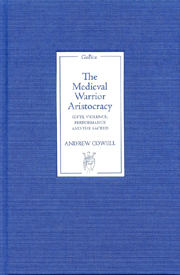Book contents
- Frontmatter
- Contents
- Acknowledgements
- Introduction
- 1 The Power of Giving
- 2 The Symbolic Constitution of the Giving Subject: William the Conqueror and Robert Guiscard
- 3 Violence and “Taking”: Towards a Generalized Symbolic Economy
- 4 Taking an Identity: The Poem of the Cid
- 5 The Sacred Kept
- 6 The Hero, Gratuity and Alterity: The Song Of Roland
- 7 The Supplemental Hero: Raoul of Cambrai
- 8 Female Integrity and Masculine Desires in The Nibelungenlied
- 9 Fractured Identities, and the Solution of Chivalry: William of Orange
- Conclusion: A New, Different Warrior Aristocracy
- Works Cited
- Index
3 - Violence and “Taking”: Towards a Generalized Symbolic Economy
Published online by Cambridge University Press: 12 September 2012
- Frontmatter
- Contents
- Acknowledgements
- Introduction
- 1 The Power of Giving
- 2 The Symbolic Constitution of the Giving Subject: William the Conqueror and Robert Guiscard
- 3 Violence and “Taking”: Towards a Generalized Symbolic Economy
- 4 Taking an Identity: The Poem of the Cid
- 5 The Sacred Kept
- 6 The Hero, Gratuity and Alterity: The Song Of Roland
- 7 The Supplemental Hero: Raoul of Cambrai
- 8 Female Integrity and Masculine Desires in The Nibelungenlied
- 9 Fractured Identities, and the Solution of Chivalry: William of Orange
- Conclusion: A New, Different Warrior Aristocracy
- Works Cited
- Index
Summary
In Geoffrey Malaterra's early twelfth-century chronicle of the Norman conquest of sicily and southern italy, he reports an encounter between the armies of Robert Guiscard and Peter of Tyre. Robert, seeing the great wealth of the opposing army and leaders, considers how he can obtain it. After consideration, he proposes a discussion in the open field between the two forces, involving only himself and Peter. All seems to go well, but then just as the two leaders arise to head back to their respective armies, Robert physically grabs Peter and “interdum portando, interdum volutando, interdum trahendo, usque ad suos perduxit” (“now carrying, now rolling, now dragging, brought him back to [Robert's] men,” De rebus gestis 1.17). This amusing (for us) and outrageous (for Peter) event would seem to be a blatant breach of the rules of reciprocity and negotiation. The Normans are jubilant about the event, on the other hand (“gaudentes quasi de triompho,” “exulting as if in a victory”). Peter is not killed however: in typical medieval fashion, he is held hostage. After a few days, he ultimately buys his freedom “pecuniam mira-bilem persolvens” (“with an enormous ransom”). Robert's extraction of money, from this and other sources, goes immediately and “abundanter” to his military companions, strengthens his own position militarily, and quickly leads to the capitulation of various Calabrian cities and their agreement to pay tribute.
- Type
- Chapter
- Information
- The Medieval Warrior AristocracyGifts, Violence, Performance, and the Sacred, pp. 52 - 63Publisher: Boydell & BrewerPrint publication year: 2007



